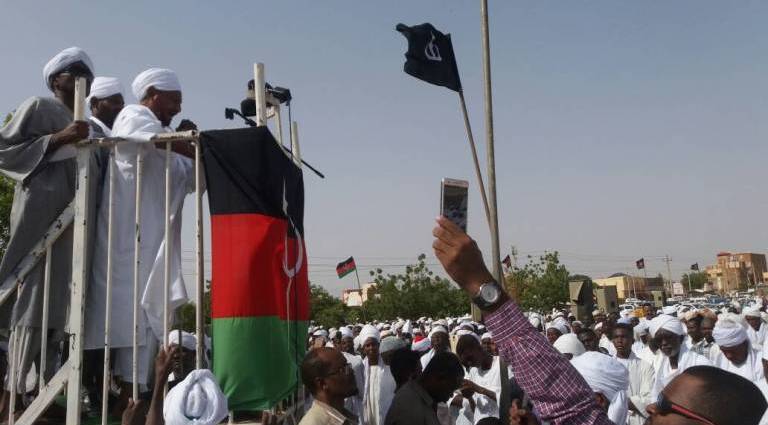Al-Mahdi describes Sudan’s dialogue as “missed opportunity”

June 25, 2017 (KHARTOUM) – The leader of Sudan’s opposition National Umma Party (NUP), al-Sadiq al-Mahdi, has described the government-led national dialogue as missed opportunity accusing the regime of failing to achieve the required reform and stop the war.
Al-Mahdi, who delivered the Eid el-Fitr sermon at Imam Abdelrahman al-Mahdi mosque in Khartoum’s twin city of Omdurman on Sunday, said the regime has reproduced its old totalitarian methods after the national dialogue, pointing to the absence of general liberties.
He held the regime responsible for the missed opportunities to achieve peace and stop the war, pointing to a number of initiatives and agreements signed between the government and the political and armed opposition.
Following three years since President Omer al-Bashir launched the national dialogue initiative in January 2014, the National Consensus Government was installed last month to implement the outcome of the dialogue conference.
The opposition groups boycotted the process because the government and the armed groups failed to sign a humanitarian truce and also due to Khartoum refusal to implement a number of confidence building measures aiming to create a conducive environment in the country before to hold the inclusive dialogue.
NORMALISING FOREIGN RELATIONS
The veteran politician said the normalisation of Sudan’s relations with the international community is conditional upon achieving just and comprehensive peace agreement and true democratic transformation irrespective of Washington’s decision on the economic sanctions imposed on the country.
A week before to leave office on 13 January 2017, former President Barak Obama decided to reduce some economic sanction on Sudan, saying it would be effective next July after an interagency report on Khartoum’s commitment to a five track deal concluded between the two countries.
Obama was keen to indicate that the decision intends to acknowledge Sudan’s efforts to reduce internal conflict, improve humanitarian access to people requiring aid and curtail “terrorism”.
Sudanese officials seem confident that the President Donald Trump would approve the permanent revocation of the economic embargo on Sudan on 12 July.
Last week, Bloomberg reported that U. S. officials involved in the process are supportive for the permanent lift of sanctions on Sudan.
He noted that the desired normalisation would lead to the cancellation of the Sudan’s external debt as well as 63 resolutions issued by the UN Security Council against Sudan and in particular resolution 1593 that referred the Darfur case to the International Criminal Court (ICC).
The ICC issued two arrest warrants against President Omer al-Bashir in 2009 and 2010 for alleged war crimes, crimes against humanity and genocide committed in Darfur.
Also, ICC judges issued arrest warrants in 2008 for militia commander Ali Mohamed Ali Abdel-Rahman, also known as Ali Kushayb and Ahmed Haroun, governor of North Kordofan state on 51 counts of alleged crimes against humanity and war crimes. But Khartoum has so far refused to hand them over.
SPLM-N RIFT AND ROADMAP
Al-Mahdi blamed the political deadlock for producing a number of negative developments including the recent rift within the rebel Sudan People’s Liberation Movement/North (SPLM-N) besides the incursion of Darfur armed groups into Sudan from neighbouring countries on the southern and western borders.
He pointed out that the SPLM-N split would adversely impact on the dialogue proposed by the Roadmap Agreement, saying the armed movements wouldn’t disappear as long as grievances exit and war could be ended through political agreement only.
The NUP leader further called on the opposition umbrella Sudan Call forces to stick to the principles of the Paris Declaration regardless of the organisational differences among them.
Al-Mahdi is a political ally of the SPLM-N. The NUP and the SPLM-N are signatories of a Roadmap agreement brokered by the African Union High Implementation Panel (AUHIP).
As a result of a rift that started earlier this year and its successive developments, the SPLM-N is now split into two factions one led by Malik Agar and the other by his rival Abdel-Aziz al-Hilu.
Al-Hilu, who gained the support of the Movement’s army, has removed Malik Agar from the leadership of the armed group together with the Secretary General Yasser Arman after they rejected his demand for the self-determination.
The government and armed groups failed in August 2017 to ink a cessation of hostilities and a humanitarian agreement to reach the needy in the war-affected zones.
For the Blue Nile and South Kordofan states, the recent rift in the group is delaying the resumption of talks as the SPLM-N has suspended its participation in the peace process until the settlement of the internal crisis.
For Darfur, the divergence over the framework of the political process prevented any progress. The mediation and facilitators are struggling to find a common group between Khartoum and the armed groups.
GULF CRISIS
Concerning the recent Gulf crisis, al-Mahdi said his party’s stance towards the crisis is driven by the interests of Sudan and the Arab and Islamic nations, pointing the regime contradicts itself when the government puts its capabilities at the disposal of one of the conflicting parties.
Earlier this month, Saudi Arabia, UAE, Egypt and Bahrain severed diplomatic ties with Qatar over alleged accusations that Doha was supporting terrorist groups who are threats to the region’s peace and security including Hamas. Also, they say that Qatar is siding Iran. But, Doha rejects all these accusations.
Sudan is among the Arab states that refused to take part in the ongoing diplomatic crisis and declared its support for the Kuwaiti efforts to settle the rift. Khartoum has strong ties with Doha and good relations with Saudi Arabia and UAE.
(ST)
